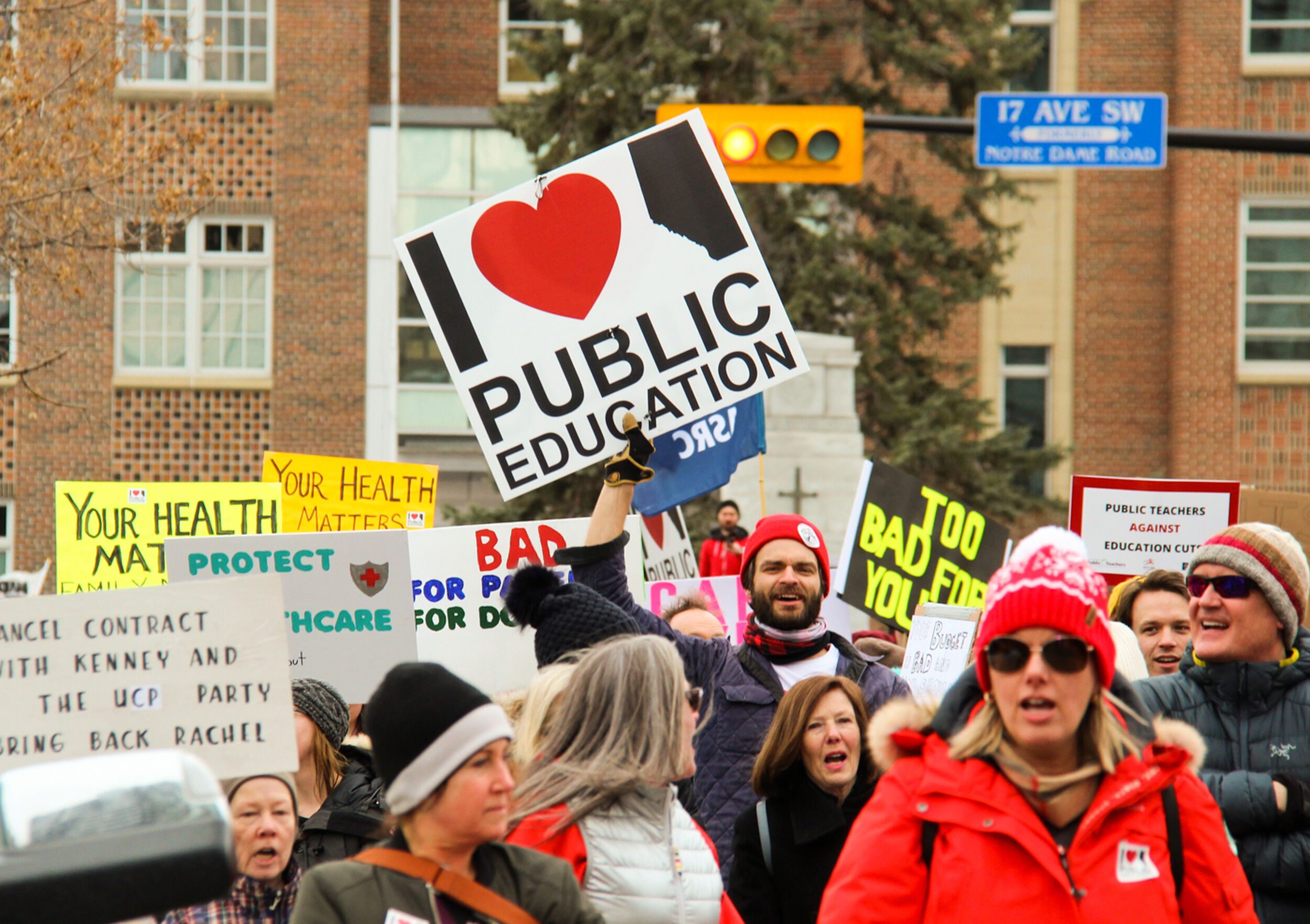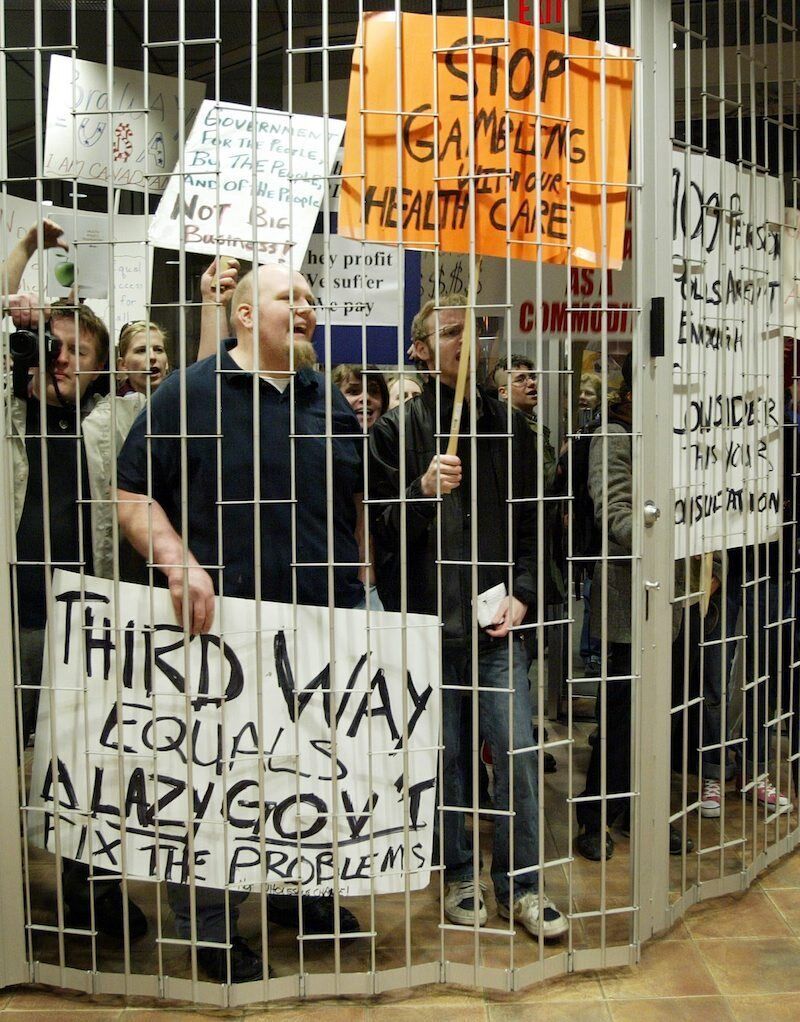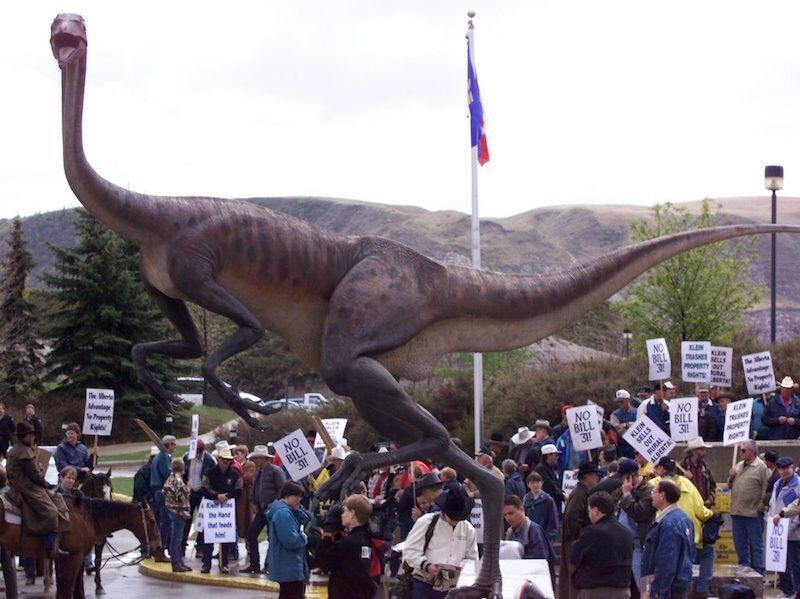
Public education rally in Calgary on February 29, 2020. Photo: Jeremy Klaszus
How does one stop a government?
Public pressure has made a difference in the past.
Support independent Calgary journalism!
Sign Me Up!The Sprawl connects Calgarians with their city through in-depth, curiosity-driven journalism. But we can't do it alone. If you value our work, support The Sprawl so we can keep digging into municipal issues in Calgary!
“I'm reminded of what premier Ralph Klein used to say. 'If a day goes by and there's not a protest, I'm wondering what I'm doing wrong.'"
— Jason Kenney, November 30, 2019
How does one stop a government?
A quirk of our Westminster-style parliamentary system is that a party with a legislative majority can do almost anything it pleases. The courts may rein a government in, but cases can take years, and governments are often free to carry on in the meantime.
The only other check is public pressure, which is ultimately a question of self-restraint—governments want to get re-elected, but they are not obligated to bend to public will.
At the moment, many Albertans are not happy with the governing party. With more than two years until an election, and given the uncompromising character of this UCP government, it can feel impossible to do anything to stop or reverse the actions of those in power determined to make Alberta great again.
But this isn’t our first such government.

Ralph Klein was a TV reporter who became mayor of Calgary in 1980, a provincial MLA in 1989, and premier in 1992. He and Kenney share more than a neoliberal ideology—their respective rises to power had striking similarities.
Imagine this: Suffering from low oil prices, Alberta has started taking on more debt. Although the situation is hardly out of control, a political narrative emerges that austerity is the only solution. Although the dominant centrist party tacks to the right to curry public favour, it is a well-known newcomer to provincial politics who wins power on no-nonsense promises to whip Alberta back into shape.
Sound familiar?
Klein was not the polished political figure Kenney tries to strike. But he was no less determined to implement the drastic and controversial policies he believed in—opponents be damned.
He had many supporters. As the New York Times noted in 1996, “[d]espite imposing some of the severest economic cutbacks in Canada since the Depression to eliminate a budget deficit,” the PCs were gaining in the polls.
Given the similarities between the two governments, there may be lessons from the 1990s for Albertans today.
But their cuts were brutal and devastating to many, particularly low-income and vulnerable families, and thousands of public sector workers in education and health care who lost their jobs.
Given the similarities between the two governments, there may be lessons from the 1990s for Albertans today.
We’ve done this before under Klein
Whatever the polls said, Klein faced regular public protests throughout his tenure, even from typically supportive groups. Hundreds of seniors demonstrated against funding cuts outside the legislature in 1994. And more than 100 farmers and cowboys protested against the premier in Drumheller in 1999 over grazing lease rights.
All politicians face protest and few enjoy it. But Klein had created a persona as an unrefined man of the people who said whatever he wanted, a luxury afforded to white male politicians.
He called protesters “jackasses” and “desperate.” He said he never protested as a student because he was “normal.”
When Indigenous demonstrators chanted and sang at a 1996 PC association meeting in Cardston, protesting health-care cuts when a two-year-old boy died after being put in a taxi rather than an ambulance, the premier said, “They could have used a few singing lessons, that’s for sure.”

By mocking and degrading protestors, Klein was sending a message to his supporters: I am in control, and these people are ridiculous.
But sometimes he had that control taken away.
In 1993, hospital laundry workers agreed to a 28% pay cut, supposedly in exchange for job security. But two years later, they were told their jobs were being outsourced to a private company.
The laundry workers, many of whom were immigrant women of colour, refused to accept the government’s decision.
Or as labour historian and professor emeritus at Athabasca University Alvin Finkel puts it, “The workers said ‘fuck this, we’re not going along.’”
Disregarding legislation that denied public-sector workers the right to strike (later ruled unconstitutional), they voted for an illegal wildcat-strike.
It was not the Canadian Union of Public Employees (CUPE) that led the action, but the workers themselves. More workers joined. Doctors voiced their support. The Calgary Herald ran letters of encouragement: “Calgarians deserve to make an honest and decent wage.”
One of the worst effects of neoliberalism has been to lower people’s expectations of the world.
By the time the government backed down, thousands of hospital workers were on strike with more set to join. King Ralph was forced by his subjects to retreat, and it only took ten days.
“It scared the government,” said Finkel.
The deal they offered only gave laundry workers job security for a year, and many felt that union leaders had agreed too hastily with the government on its heels. Hospital laundry services were contracted out two years later.
Still, the action proved that public pressure tactics could work.
Finkel says the moment was a turning point for the labour movement in the province: When Klein put forward controversial health-care reforms in 2000, the movement was more prepared, forcing him to back down under tremendous public pressure.
Harnessing the power of workers
Kenney has seemed even more willing than Klein to court controversy. But nearly three decades later, Alberta looks very different. The population has gotten larger, more diverse, less socially conservative and more educated.
Albertans today are more likely to recognize issues like climate change and systemic racism as real threats. The future of the fossil fuel industry is far less bright. And the media landscape is more complex and fragmented.
Emma Jackson, a co-founder of Climate Justice Edmonton, sees organizing as raising people’s expectations.
“One of the worst effects of neoliberalism has been to lower people’s expectations of the world,” she said.
Mass rallies are not what is going to change things. What we’re looking for is how do we move people towards mass non-cooperation.
Jackson pointed to the tremendous and sustained turnout for multiple Black Lives Matter rallies as something many organizers have taken notice of and tried to learn from.
But the pandemic and its adjacent economic effects have also changed people’s perceptions. Albertans have a multitude of significant issues facing them that deeply affect their lives. The stakes are higher for more people than at any time in the province’s history.
“I think it’s raised people’s expectations to think, ‘Oh, everyone should have the ability to live safe and secure lives,’” said Jackson. “I think our role as organizers is to capture this, and to move people to the understanding that you don’t just deserve this during a pandemic.”
Jackson was part of a group who staged an “aerial blockade” by hanging from a Vancouver bridge to block tanker traffic in 2018. Such dramatic actions are useful for gaining mass attention, while rallies and marches can both project power and give people confidence that they’re not alone, she says.
Julie Jacques, lead organizer for the Alberta Union of Public Employees (AUPE), says the pandemic has complicated the logistical aspects of organizing, but people are still motivated to participate.
“It makes it more challenging, but I think in the end it comes down to people coming together [for] change.”
It’s possible the UCP will be more sensitive to public pressure tactics closer to the end of its mandate.
Both Jacques and Jackson agree on the importance of real-world action over online campaigns. But just getting people in the streets won’t be enough, says Jackson.
“Mass rallies are not what is going to change things. What we’re looking for is how do we move people towards mass non-cooperation.”
This is the point of a strike, like the one begun by laundry workers in 1993: to harness the power of workers acting collectively.
“There’s power in numbers,” said Jacques.
Collective public pressure
It’s common for governments to get unpopular moves out of the way early in a term. The idea is that, by election time, voters will have forgotten about that thing they were upset about a year or two ago, especially with the distractions of carefully timed good-news announcements leading up to a campaign.
April will mark the halfway point to the next election, and it’s possible the UCP will be more sensitive to public pressure tactics closer to the end of its mandate than they are now.
Jackson, Finkel and Jacques, however, all agree that the Kenney government currently seems disinterested in what the public thinks.
Short of a general strike, probably nothing would impress this government.
“I don’t believe at all that they care about public opinion,” said Jacques. “They have what they want in their heads, and they’re going to push that through.”
“Short of a general strike, probably nothing would impress this government,” said Finkel. “They’re more determined than Klein was.”
But even Klein was susceptible to an event that began with just a handful of hospital laundry workers.
“A movement often just grows because it catches fire,” said Finkel.
“If the working class looks pretty serious and is able to convince people that they’re aren’t just striking for themselves but for everybody, then the government could find itself unable to govern without caving in.”
Taylor Lambert is the Alberta politics reporter for The Sprawl.
Support independent Calgary journalism!
Sign Me Up!The Sprawl connects Calgarians with their city through in-depth, curiosity-driven journalism. But we can't do it alone. If you value our work, support The Sprawl so we can keep digging into municipal issues in Calgary!




